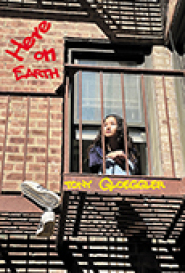
Marion McCready, Look to the Crocus
The Telephone Box
The praying mantis of an oak leaf
left in the relic of an old red telephone box
grows fat on every private conversation,
every secret flapping its wings
against the glass.
The oak leaf lies next to the fallen
black handle of the handset as if the words,
weighing it down, were finally escaping.
I replace the handset to leave room for hope.
The shiny steel of the keypad illuminated
in the morning light is the face of someone
who knows better.
In a dream, I blow a storm
into the mouthpiece of the handle.
Every morning I pass by the silent phone box
standing like a comedian waiting her cue.
We are both waiting for a call from across
the Holy Loch, from across the Firth of Clyde
for the voice that does not say my name.
Instead asks for the heron, the oystercatcher
and the jackdaw.
Kelly Sargent, Echoes in My Eyes
What Did They Say?
Your twin sister is retarded, the teenage neighbor boy
sneers over the picket fence.
What did he say? your grass-stained four-year-old hands
sign to me between somersaults.
He’s mad because he can’t do a somersault
as good yours, I tell you,
and lead you to the peeling swing set
on the other side of our house.
When you go in to fetch us cans of Hawaiian Punch,
I run to the fence and spit at his inky shadow through a narrow slat.
On another day, a gangly blond girl
who lives three doors down the street
points at you and shouts retard
as we pedal gleaming new bikes with training wheels—
mine with a white wicker basket
and yours with red, white, and blue streamers—
down the sidewalk past her porch.
What did she say? you sign beside me
with one hand off the handlebar.
She likes your streamers, I sign.
When you turn your head
to look at a squirrel that has caught your eye,
I show the gangly blond girl a lone finger,
like I had seen grown-ups do sometimes when they were mad.
Months later, when it is time to enroll us in kindergarten
in a new country, grown-ups separate us
because they say I will help you too much
if we are in the same classroom.
No one signs in your new classroom;
everyone is hearing.
We, at least, ride the school bus home together.
You tell me every day: I don’t know what they say.
We play “School” every day when we get home
with our Fisher Price desk and a slate with blue chalk.
I arrange magnetic letters of the alphabet
and count with colored beads I put into piles
to teach you what I learn in my classroom—every single day.
Now it’s your turn, I tell you.
Pretend you are Teacher
and teach Owl the same things I just taught you.
Nearly two years later, in another country again,
we find our second new school—
this one with one classroom for deaf students—
and grown-ups test you when we enroll.
She learned much more than one would have expected, they say.
They speak of your intelligence and your capability.
And I tell you
…what they say.



